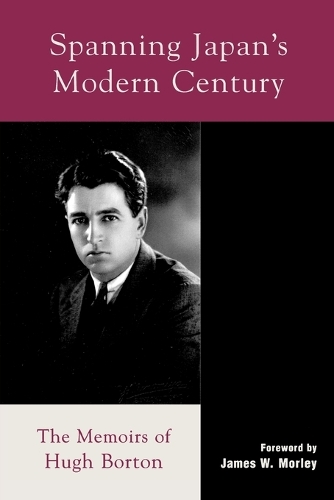
Spanning Japan's Modern Century: The Memoirs of Hugh Borton
(Paperback)
Publishing Details
Spanning Japan's Modern Century: The Memoirs of Hugh Borton
By (Author) Hugh Borton
Foreword by James W. Morley
Bloomsbury Publishing PLC
Lexington Books
2nd October 2002
United States
Classifications
Tertiary Education
Non Fiction
Biography: historical, political and military
Asian history
Constitution: government and the state
327.73052
Physical Properties
Paperback
288
Width 152mm, Height 228mm, Spine 21mm
431g
Description
"Spanning Japan's Modern Century" is the memoir of Hugh Borton, an extraordinary man and devout Quaker who in 1942, as a 39-year-old assistant professor of Japanese history, was called to the State Department, where he rose rapidly to become one of the principal architects of United States policy toward post-war Japan. Drawn from Borton's personal papers this work provides a fresh and intimate picture of the man who played a pivotal role in defining the meaning of unconditional surrender for Japan, retaining the Emperor, and designing Japan's post-war constitution. It sheds fascinating, new light on the development of the United States' post-war Japanese policy and the often-fractious relationships between the various agencies tasked with its creation and implementation.
Reviews
Spanning Japan's Modern Century will be greatly welcomed by historians. As one of the first Americans to work seriously on Japanese history, Hugh Borton's account of his career provides absorbing reading for anyone interested in the early development of Japanese studies in the West, but his exceptional experience as a State Department official in the crucial years between 1942 and 1948 give his recollections a further significance of a quite different kind. They offer an insider's view of, among many other things, American wartime planning for post-surrender Japan, relations between Washington and General MacArthur in the early stages of the postwar Occupation of Japan, and the attempts by the Far Eastern Commission to influence the process of Japanese constitutional reform in 1946, and they also throw new light on the problems Washington faced in dealing with Korea in the aftermath of Japan's defeat. Other Americans who were involved in this key period for East Asia have written about their experiences, but the length of Borton's service and his central role in shaping American policy on such vital issues as the treatment of the emperor and Japanese political reform give these memoirs a unique importance. -- Richard Sims, School of Oriental and African Studies, University of London
This autobiography by Hugh Borton, published posthumously, is a moving account of one man's quest for truth and wisdom as he pursued a career as a pioneering scholar of modern Japan and as an equally path-blazing official in Washington involved in policy decisions concerning that country. . . . The book will fill the hearts of all readers with warmth and wonder that one person, without any prior connections, should have contributed so much to U.S.-Japanese relations out of the sheer strength of his character and sense of history. -- Akira Iriye, Charles Warren Research Professor of American History, Harvard University
The Borton memoirs provide fascinating insights into Japan's modern history from a scholar who first traveled to that country in 1928 and later played a key role in designing the political reforms implemented during the Occupation. -- James L. McClain, Brown University
An engaging memoir of a pacifist Quaker historian of Japan who, during World War II, found himself a principal drafter of US policy for postwar Japan,including the decision to retain the emperor and allow economic reconstruction after the defeat. However larger than life General Douglas MacArthur liked to appear, history in postwar East Asia was also made by quiet, sober figures like Borton, ordinary people working in extraordinary times. -- Carol Gluck, Columbia University
Author Bio
Hugh Borton taught at Columbia University and later served as President of Haverford College. He is the author of a number of seminal works on Japan, including Japan's Modern Century (1955).
